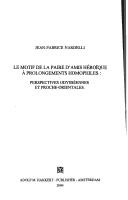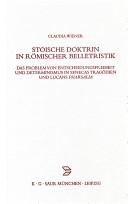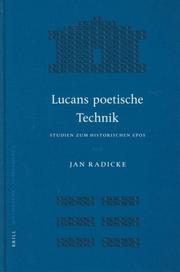| Listing 1 - 10 of 15 | << page >> |
Sort by
|
Digital
Year: 1695 Publisher: Leipzig In verlegung Moritz Georg Weidmans erben und Johann Ludwig Gleditsch
Abstract | Keywords | Export | Availability | Bookmark
 Loading...
Loading...Choose an application
- Reference Manager
- EndNote
- RefWorks (Direct export to RefWorks)
Book
ISBN: 9782251448268 2251448268 Year: 2018 Volume: 82 Publisher: Paris Les Belles Lettres
Abstract | Keywords | Export | Availability | Bookmark
 Loading...
Loading...Choose an application
- Reference Manager
- EndNote
- RefWorks (Direct export to RefWorks)
Memory in literature. --- Death in literature --- Latin literature --- Glory in literature --- Mémoire dans la littérature --- Mort dans la littérature --- Gloire dans la littérature --- Themes, motives --- Lucan, --- Memory in literature --- War in literature --- Civil war in literature --- Criticism and interpretation --- Lucan, - 39-65 - Criticism and interpretation --- Lucan, - 39-65. - Pharsalia --- Lucan, - 39-65
Book
ISBN: 9781107614451 9781107041707 1107614457 1107041708 Year: 2019 Publisher: Cambridge : Cambridge university press,
Abstract | Keywords | Export | Availability | Bookmark
 Loading...
Loading...Choose an application
- Reference Manager
- EndNote
- RefWorks (Direct export to RefWorks)
Book VII of Lucan's De Bello Ciuili recounts the decisive victory of Julius Caesar over Pompey at the Battle of Pharsalus on 9 August 48 BCE. Uniquely within Lucan's epic, the entire book is devoted to one event, as the narrator struggles to convey the full horror and significance of Romans fighting against Romans and of the republican defeat. Book VII shows both De Bello Ciuili and its impassioned, partisan narrator at their idiosyncratic best. Lucan's account of Pharsalus well illustrates his poem's macabre aesthetic, his commitment to paradox and hyperbole, and his highly rhetorical presentation of events. This is the first English commentary on this important book for more than half a century. It provides extensive help with Lucan's Latin, and seeks to orientate students and scholars to the most important issues, themes and aspects of this brilliant poem.
Lucan, --- Pharsalus, Battle of, Farsala, Greece, 48 B.C --- Pharsalia (Lucan). --- 48-48 B.C. --- Greece --- Lucan, - 39-65. - Pharsalia. - Liber 7
Book
ISBN: 1107301440 1107235650 1107305659 1107306531 1107312086 1299009018 1107314283 1139105752 1107308739 9781107308732 9781107314283 9781107306530 9781139105750 9781107020603 1107020603 1108816428 Year: 2013 Publisher: Cambridge Cambridge University Press
Abstract | Keywords | Export | Availability | Bookmark
 Loading...
Loading...Choose an application
- Reference Manager
- EndNote
- RefWorks (Direct export to RefWorks)
This is the first comprehensive study of the sublime in Lucan. Drawing upon renewed literary-critical interest in the tradition of philosophical aesthetics, Henry Day argues that the category of the sublime offers a means of moving beyond readings of Lucan's Bellum Civile in terms of the poem's political commitment or, alternatively, nihilism. Demonstrating in dialogue with theorists from Burke and Kant to Freud, Lyotard and Ankersmit the continuing vitality of Longinus' foundational treatise On the Sublime, Day charts Lucan's complex and instructive exploration of the relationship between sublimity and ethical discourses of freedom and oppression. Through the Bellum Civile's cataclysmic vision of civil war and metapoetic accounts of its own genesis, through its heated linguistic texture and proclaimed effects upon future readers and, most powerfully of all, through its representation of its twin protagonists Caesar and Pompey, Lucan's great epic emerges as a central text in the history of the sublime.
Sublime, The, in literature. --- Lucan, --- Lucanus, Marcus Annaeus, --- Lukan, Mark Anneĭ, --- Lucain, --- Lucano, Marco Anneo, --- Lucanus, Marcus Annaeus --- Criticism and interpretation. --- Arts and Humanities --- History --- Sublime, The, in literature --- Lucan, - 39-65 - Criticism and interpretation --- Lucan --- Lucano, Marco Antonio --- Lucain --- Lucano --- Lucan, - 39-65
Book
ISBN: 0674904664 9780674904668 Year: 1971 Publisher: Cambridge, Mass., : Harvard University Press,
Abstract | Keywords | Export | Availability | Bookmark
 Loading...
Loading...Choose an application
- Reference Manager
- EndNote
- RefWorks (Direct export to RefWorks)
Transmission of texts --- Transmission de textes --- Lucan, --- Manuscripts --- Rome --- History --- Literature and the war --- Histoire --- Littérature et guerre --- Epic poetry, Latin --- Manuscripts, Latin (Medieval and modern) --- Criticism, Textual --- Criticism, Textual. --- Literature and the war. --- Manuscripts, Latin (Medieval and modern). --- Manuscripts. --- Littérature et guerre --- Epic poetry, Latin - Criticism, Textual --- Transmission of texts - History - To 1500 --- Lucan, - 39-65 - Pharsalia - Criticism, Textual --- Rome - History - Civil War, 49-45 B.C. - Literature and the war --- Lucan, - 39-65 - Pharsalia
Book
ISBN: 9783825365493 3825365492 3825375641 9783825375645 Year: 2016 Volume: 151 Publisher: Heidelberg
Abstract | Keywords | Export | Availability | Bookmark
 Loading...
Loading...Choose an application
- Reference Manager
- EndNote
- RefWorks (Direct export to RefWorks)
Latin poetry --- Latin literature --- History and criticism --- Lucan, --- Claudianus, Claudius --- Claudian --- Claudien --- Claudià, Claudi --- Claudiano, Claudio --- Claudius Claudianus --- Klavdian --- Клавдиан --- Klavdian, Klavdiĭ --- Клавдиан, Клавдий --- Pseudo-Claudianus --- Lucanus, Marcus Annaeus, --- Lukan, Mark Anneĭ, --- Lucain, --- Lucano, Marco Anneo, --- Lucanus, Marcus Annaeus --- Criticism and interpretation --- Latin poetry. --- Political poetry, Latin --- Epic poetry, Latin --- Mythology, Roman --- Poésie politique latine --- Poésie latine --- Poésie épique latine --- Mythologie romaine --- Congresses --- Congresses. --- Histoire et critique --- Congrès --- Lucan, - 39-65 - Criticism and interpretation - Congresses --- Claudianus, Claudius - Criticism and interpretation - Congresses --- Lucan, - 39-65

ISBN: 8820505045 8820501783 9788820501785 9788820505042 Year: 1979 Volume: 63/2 Publisher: Milano Cisalpino-Goliardica
Abstract | Keywords | Export | Availability | Bookmark
 Loading...
Loading...Choose an application
- Reference Manager
- EndNote
- RefWorks (Direct export to RefWorks)
Epic poetry, Latin --- History and criticism --- Lucan, --- Scholia --- Rome --- History --- Literature and the war --- History and criticism. --- Lucan --- -Scholia --- -Literature and the war. --- -Latin epic poetry --- Latin poetry --- Rim --- Roman Empire --- Roman Republic (510-30 B.C.) --- Romi (Empire) --- Byzantine Empire --- Rome (Italy) --- -Lucain --- Lucano --- -History and criticism --- -Lucanus, Marcus Annaeus --- Lucano, Marco Antonio --- Lucain --- Epic poetry, Latin - History and criticism --- Lucan, - 39-65 - Scholia --- Rome - History - Civil War, 49-45 B.C. - Literature and the war --- -Lucan --- Lucanus, Marcus Annaeus --- Lucanus, Marcus Annaeus, --- Lukan, Mark Anneĭ, --- Lucain, --- Lucano, Marco Anneo, --- Lucan, - 39-65

ISBN: 9783598778384 3598778384 3110918404 Year: 2012 Volume: 226 Publisher: Leipzig : B. G. Teubner,
Abstract | Keywords | Export | Availability | Bookmark
 Loading...
Loading...Choose an application
- Reference Manager
- EndNote
- RefWorks (Direct export to RefWorks)
Die Studie richtet sich gegen die verbreitete Auffassung, Senecas Tragödien und Lucans Bürgerkriegsepos demonstrieren die Enttäuschung ihrer Autoren darüber, dass die stoische Doktrin angesichts des Bösen im menschlichen Handeln oder unvermeidbarer Schicksalsschläge keine überzeugende Antwort bereithalte. Die Werke beider Dichter setzen gezielt und in paralleler Behandlung die stoischen Fragestellungen zum Spannungsfeld von menschlicher Entscheidungsfreiheit und Determinismus literarisch um. This study contests the widespread view that Seneca's tragedies and Lucan's epic on the civil war express their authors' disappointment at the failure of Stoic doctrine to provide convincing answers to the problems of evil in human behaviour or the inescapable blows of Fate. The works of both writers, parallel in treatment, aim at the representation in literature of the tensions between human free-will and determinism.
Stoics in literature --- Free will and determinism --- Seneca, Lucius Annaeus, --- Lucan, --- Free will and determinism. --- Stoics in literature. --- Compatibilism --- Determinism and free will --- Determinism and indeterminism --- Free agency --- Freedom and determinism --- Freedom of the will --- Indeterminism --- Liberty of the will --- Determinism (Philosophy) --- Pypłacz, Joanna. --- Seneca, Lucius Annaeus, - ca. 4 B.C.-65 A.D. - Tragedies --- Lucan, - 39-65. - Pharsalia

ISBN: 9004137459 9047413032 9789004137455 9789047413035 Year: 2004 Volume: 249 Publisher: Leiden
Abstract | Keywords | Export | Availability | Bookmark
 Loading...
Loading...Choose an application
- Reference Manager
- EndNote
- RefWorks (Direct export to RefWorks)
The present volume on Lucan’s poetical technique focusses on the main artistic principles of the Pharsalia, studying both the underlying history of the Civil War and its poetical reworking by the author. A chapter on Lucan's historical source (Livy) is followed by a chapter on Lucan's poetical technique and the general outline of his work. The material basis for these chapters is provided by a detailed analysis of every single book of the Pharsalia, which takes the form of a 'historical-poetical' commentary. The study closes with a chapter on the narrator and the author.
Ancient rhetoric --- Antieke retoriek --- Retoriek [Antieke ] --- Retoriek van de Oudheid --- Rhetoric [Ancient ] --- Rhétorique ancienne --- Rhétorique de l'Antiquité --- Epic poetry, Latin --- Rhetoric, Ancient --- Poésie épique latine --- History and criticism --- Histoire et critique --- Lucan, --- Rome --- History --- Literature and the war --- Histoire --- Littérature et guerre --- Technique --- Rhetoric, Ancient. --- History and criticism. --- Technique. --- Literature and the war. --- Poésie épique latine --- Rhétorique ancienne --- Littérature et guerre --- Classical languages --- Greek language --- Greek rhetoric --- Latin language --- Latin rhetoric --- Rhetoric --- Lucanus, Marcus Annaeus, --- Lukan, Mark Anneĭ, --- Lucain, --- Lucano, Marco Anneo, --- Lucanus, Marcus Annaeus --- Pypłacz, Joanna. --- Lucan --- Epic poetry [Latin ] --- Civil War, 49-45 B.C. --- Epic poetry, Latin - History and criticism --- Lucan, - 39-65 - Technique --- Rome - History - Civil War, 49-45 B.C. - Literature and the war --- Lucano, Marco Antonio --- Lucain --- Lucano --- Lucan, - 39-65
Book
ISBN: 9780226111872 0226111873 0226111903 1282239481 9786612239489 Year: 2009 Publisher: Chicago University of Chicago press
Abstract | Keywords | Export | Availability | Bookmark
 Loading...
Loading...Choose an application
- Reference Manager
- EndNote
- RefWorks (Direct export to RefWorks)
Latin epics such as Virgil's Aeneid, Lucan's Civil War, and Statius's Thebaid addressed Roman aristocrats whose dealings in gifts, favors, and payments defined their conceptions of social order. In The Commerce of War, Neil Coffee argues that these exchanges play a central yet overlooked role in epic depictions of Roman society. Tracing the collapse of an aristocratic worldview across all three poems, Coffee highlights the distinction they draw between reciprocal gift giving among elites and the more problematic behaviors of buying and
Negotiation --- Reciprocity (Commerce) --- War in literature. --- Virgil. --- Lucan, --- Statius, P. Papinius --- Lucan. --- Lucan, 39-65. --- Negotiation - Rome. --- Negotiation -- Rome. --- Pharsalia. --- Reciprocity (Commerce) - Rome. --- Reciprocity (Commerce) -- Rome. --- Statius, P. Papinius. --- Statius, P. Papinius (Publius Papinius). --- Thebais. --- Virgil. Aeneis. --- War in literature --- Greek & Latin Languages & Literatures --- Languages & Literatures --- Fair trade (Tariff) --- Reciprocity --- Commercial policy --- Commercial treaties --- Favored nation clause --- Tariff --- Bargaining --- Dickering --- Haggling --- Higgling --- Negotiating --- Negotiations --- Discussion --- Psychology, Applied --- Pypłacz, Joanna.
| Listing 1 - 10 of 15 | << page >> |
Sort by
|

 Search
Search Feedback
Feedback About UniCat
About UniCat  Help
Help News
News